Findings of the International Transport Forum (ITF) 187 Roundtable on Artificial Intelligence (AI) in Proactive Road Infrastructure Safety Management have been published noting the important potential and role of AiRAP.
AI pushes the limits of pattern recognition beyond human capabilities and may hold the key to identifying unknown crash-prone road configurations to save lives.
The ITF AI Roundtable in February 2021 brought together experts from 33 organisations and 15 countries to examine and determine the most relevant cases for artificial intelligence use in a transport planning context for crash prevention on an entire road network.
The report summarises the findings of the roundtable and explores the possibility of using computer vision to acquire relevant information and the capability of computer models to map high-risk locations. Recommendations are offered to stakeholders on the development and appropriate use of lifesaving AI solutions.
AI facilitates proactive traffic safety management in two ways: Through sensors and systems such as computer vision, it helps collect data on road infrastructure condition and traffic events over an entire road network. And, through predictive models, AI learns to identify locations on the network where crash risk is highest. In regions where precise and relevant data exists, AI can identify dangerous locations proactively, before crashes happen.
However, many consider AI as lacking traditional statistical models’ transparency and interpretability of predictions. Computing power being broadly available, what now limits AI is availability of data and of skilled individuals to supervise modelling. Data are often in short supply because they remain in silos instead of being shared and it is noted that the automotive industry holds some of the most precious data for risk prediction.
The report recommends to:
- Develop a competitive market for sharing and monetising traffic and mobility data
- Do no wait for real-time data to develop risk maps
- Mandate the sharing of aggregate vehicle data
- Learn from other fields and best practice for data sharing and privacy protection
- Support research and innovation towards trusted and explainable AI
- Align new tools with precise policy objectives
- Develop new skills and digital infrastructure
- Clarify regulatory frameworks for data protection and digital security
- Design user-friendly, risk-mapping tools
iRAP’s accelerated and intelligent collection and coding of road attribute data initiative, known as AiRAP was included in the Roundtable Review and features in the report.
AiRAP has the potential to reduce the time and effort road safety assessments require, reduce costs per unit of road length, improve accuracy and make data available for every road on earth.
To unlock this potential, AiRAP’s main goal is to source road attribute, traffic flow, and speed data following iRAP’s “common global specification” and map safety performance and star ratings.
AiRAP captures advances in artificial intelligence, machine learning, vision systems (street and sky), LIDAR, telematics and other data sources.
Providers can propose translation routines to convert machine collected data into iRAP-compliant data with the conversion certified by iRAP. The data are to be published worldwide, along with any associated conditions of use, as agreed by iRAP and the provider.
Read the ITF Roundtable Report here.
For more information on AiRAP, visit https://irap.org/project/ai-rap/
ITF Roundtables bring together international experts to discuss specific topics notably on economic and regulatory aspects of transport policies in ITF’s 63 member countries.
ITF is an intergovernmental organisation with 63 member countries. It acts as a think tank for transport policy and organises the Annual Summit of transport ministers.
The AI Roundtable participants represented public authorities, the transport, technology and data industries, research institutes and international organisations.

















